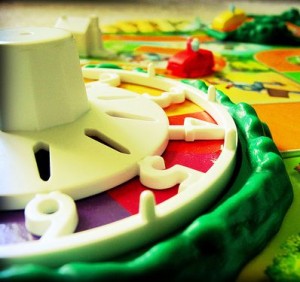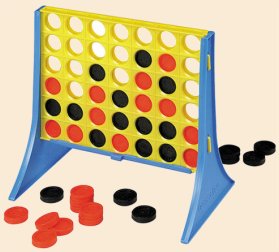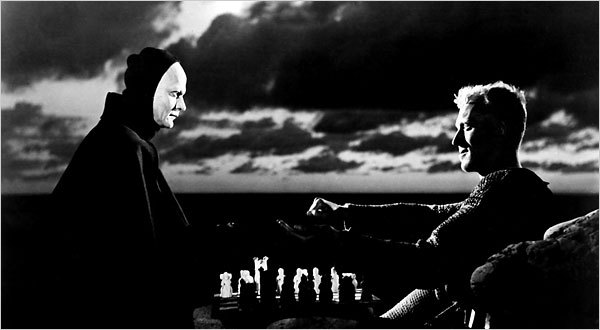[Think Tank returns today, this time with our takes on the best board games of all time. When you’re done, head over to Part II and then vote for your favorite. —Ed.]
The Game of Life
from Matthew Belinkie
This board game is meant to encompass the full range of human experience, from birth to death, from marriage to inheriting a skunk farm. It’s the War and Peace of board games.
 The Game of Life was the one big hit of Civil War era printer-turned-game-designer Milton Bradley. However, his version was a lot different than the Life we now know. The modern game was introduced in 1960, on the hundredth anniversary of Bradley’s original. The new Game tells us a lot about the way Americans viewed life back in that Leave It to Beaver era. You got married young. You picked a career and stuck with it forever. The automobile was the center of your world. And your success was measured solely in dollars.
The Game of Life was the one big hit of Civil War era printer-turned-game-designer Milton Bradley. However, his version was a lot different than the Life we now know. The modern game was introduced in 1960, on the hundredth anniversary of Bradley’s original. The new Game tells us a lot about the way Americans viewed life back in that Leave It to Beaver era. You got married young. You picked a career and stuck with it forever. The automobile was the center of your world. And your success was measured solely in dollars.
But here’s what’s really twisted about it: Life doesn’t reward cleverness or hard work. The player is the hapless hobbyhorse of blind chance. That uncertainty is what makes a board game fun, but as a metaphor for life, it’s pretty terrifying. You’re not free to pursue your dreams–you just spin the spinner and see what Life does to you.
I always wondered about my little blue peg as he drove down the way to dusty death. Was he growing body hair, then losing head hair? Was his little blue face becoming creased with wrinkles as the years flew by? Was he proud that the little blue peg in the backseat looked just like him?
And what about that little pink peg sitting next to him? Was she happy? Or was that plastic car looking more and more like her prison?
And what about me? What square would I be standing on, if I were on that board? Was I doing better or worse than my little blue peg? Honestly, Life always depressed me, even when I won. That’s high praise.
The old commercial chirped, “Be a winner at the Game of Life!” But in Life, there are no winners. When the game ends, everyone is dead – that makes it a tie in my book.
By the way, click here (NSFW).
Electronic Dream Phone
from fenzel
One of a bevy of NKOTB-era hotties in denim jackets has a secret crush on you — but you don’t know which one! Thank your lucky laser-blue, glittery neon stars you have Electronic Dream Phone!
Use this battery-powered peripheral to play pre-recorded clues from the gaggle of radical dudes and hunt and capture your own hunk, crushing and disappointing your less attractive friends! Oh, the torture — both for the frustrated tween vying for her own hetero Jordan Knight and the feminist who just had a heart attack reading the last two paragraphs! It’s like Mystery Date with extra consumerism!
I have never played this game. It probably offers several orders of magnitude of suck. But I have four sisters, and we had it in our basement for ten years. Watch this commercial and behold the horror:
http://www.youtube.com/watch?v=YiMOt-CkEhw
Here’s the thing: Everybody thinks they’re too cool to play with the Electronic Dream Phone.
Everybody.
And you know who turns out to be wrong about how cool they are?
Everybody.
I don’t there was a single person who came over to my house while Dream Phone resided therein who did not eventually pull out that phone and start pushing the buttons.
“He’s not at the mall!”
“He’s not wearing a hat!”
Even when these statements are meaningless, they’re fascinating. Watching people discover it is fascinating. I’ve never seen an object in the world more humbling than the Electronic Dream Phone. It dashes our pretensions about who we think we are as a culture and civilization. It’s a dark mirror that talks to you in a Southern California accent. It’s the best conversation piece ever.
Yeah, never play the piece of crap game, but how often do you play the board games you’ve owned over the years anyway?
Connect Four
by lee
I’m reading your mind. It’s going something like this:
- Wait a minute. Is Connect Four a board game? I’m looking this up on Wikipedia.
- Wikipedia (and by Wikipedia, you mean the fourteen year old boy who edited this article 15 minutes ago) explicitly says it’s not a board game!!!!
- You are wrong!!!
- Shame on you for thinking Connect Four is a board game!!! And shame on Connect Four for thinking it’s a board game!!!
Ain’t no shame in this game. I’m proudly standing up for Connect Four, a board game that chose to stand out from the pack. This game dares to be different.

The Original Maverick.
Other “board games” are content with keeping their large surface areas securely anchored to a floor or tabletop. Cowards, I say. Connect Four does it the hard way: it precariously stands tall on two plastic legs while its forty-two holes stare defiantly into the players’ eyes.
For the naysayers who point out Connect Four’s lack of a “board” in the traditional sense, I have this to say: Connect Four could just as easily be played on a flat surface with the same rules. But you know what you would lose if it were played on a mere horizontal board? Unadulterated velocity. The speed of the piece as Connect Four harnesses the power of the Earth’s gravitational pull. The pounding of plastic on plastic as the piece’s journey comes to a crashing halt. The cataclysmic disgorging of its contents at the end of a match.
Connect Four is both a board game and so much more than a board game. It’s a bold statement of choosing speed and originality over stability and the status quo.
[Now go read Part II and then vote for the best video game ever. —Ed.]

Forwarded without comment:
The Case Against Candy Land
http://www.boingboing.net/2009/01/26/the-case-against-can.html
Although these are all good options, I must say that the game which immediately jumps to my mind is “Guess Who?”. I played it quite a bit as a child and always had a good time. Looking back, I’m a little ashamed of myself.
The game encourages the participants to distill a wide array of people down to their most basic physical features. “Are you fat?” and “Do you wear glasses?” are routine questions designed to ferret out the losers — presumably the game exists to prepare children for the high school experience, where the same logic is unfortunately applied.
In some editions, there were a few token minorities, in case you’re wondering whether people can be as easily defined by their race as their eyewear. Ageism was also a component, for those who want the full gamut of stereotyping, though at that age, “old” was pretty much anyone who had survived to double digits. Still, determining whether the mystery person had white hair was great for focusing in on a few suspects.
To be fair, the range of questions available is limitless, but it seems like a stretch to suggest that most children will see how rich their options are. It’s much easier to define somebody by their facial hair than the number of letters in their name.
Just my two cents!
http://www.boardgamegeek.com/boardgame/4143
Honorable Mention should go to Sorry! because while all kids’ games teach social skills applicable to the real world, Sorry! is the only one that gets to the real, nitty gritty truths in life. After all, is the kid ACTUALLY sorry when they bump another player’s piece? No. No they’re not. Sorry! teaches kids that sometimes it’s best to lie a little in order to keep someone else’s feelings from being hurt, helping them learn methods of false sincerity they’ll use until the day they die.
Ahh, I see that this is the best board game ever for non gamers. Connect 4? Life? Mystery Date (aka electronic dream phone)? Come on. Where is Ticket To Ride, Settlers of Catan, Arkham Horror? Hell, Risk? At least with Risk there is some strategy other than “be the first to cross the toll road”. By the way, Sorry and Candy Land are not games. See Pianodan’s link.
Best Board Game ever my (insert body part here).
Thnikman- If you want to go “hardcore” gaming, how about Shadows Over Camelot or Pandemic, Agricola or Betrayal at the House on the Hill? Stone Age? Risk is the only game you mentioned I have never played, oddly enough.
Wait: MUNCHKIN!
I think since non-gamers make up The Popular Culture more than gamers, it makes sense that the “best” games *wouldn’t* include titles like Ticket to Ride and such. You’d want a game that can appeal to anybody, hardcore gamer or not, because that means it is done well enough for any level-gamer to enjoy it. I actually think Shechner’s choice of Clue is the best- and it’s what I was thinking myself (hence why I said “honorable mention” about Sorry! and waited to see what everyone else picked, jic there was overlap). See why on the next half of the article if you care (or dare, dun dun DUUUN).
I never had the Electronic Dream Phone, but I did have the Girl Talk version, “Date Line.” To determine whether the match worked, you’d put their little cards into the speakery thing and hear their phone conversation. Freud might have had a thing or two to say about the way the cards went into the slot together, and that being the only way to determine compatibility…